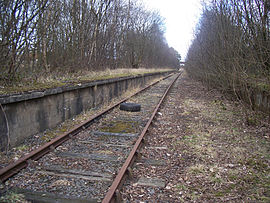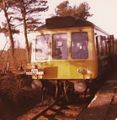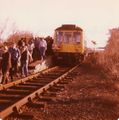Difference between revisions of "Giffen Railway Station"
(Created page with "{{Infobox UK disused station |name = Giffen |image_name = Giffen station.jpg |caption = The remains of Giffen station in 2006 |line = Lanarkshire and Ayrshire...") |
|||
| Line 1: | Line 1: | ||
| − | {{ | + | {{TrainStation |
| − | |name = Giffen | + | |name = Giffen Station |
| − | | | + | |image = [[File:Giffen station.jpg|270px]] |
| − | | | + | |operator = Lanarkshire and Ayrshire Railway |
| − | | | + | |location = Near Barrmill |
| − | | | + | |county = North Ayrshire |
| − | | | + | |opened = 3rd September 1888 |
| − | | | + | |closed = 4th July 1932 |
| − | | | + | {{#display_map: 55.7202,-4.6125|mappingservice=leaflet|zoom=14}} |
| − | |||
| − | |||
| − | |||
| − | |||
| − | |||
| − | |||
| − | |||
| − | | | ||
| − | | | ||
}} | }} | ||
| + | {{DabStation|Closed Railway Station|North Ayrshire|}} | ||
| + | |||
'''Giffen railway station''' was a [[railway station]] approximately one mile south-west of the village of [[Barrmill]], [[North Ayrshire]], [[Scotland]]. The station was part of the [[Lanarkshire and Ayrshire Railway]]. | '''Giffen railway station''' was a [[railway station]] approximately one mile south-west of the village of [[Barrmill]], [[North Ayrshire]], [[Scotland]]. The station was part of the [[Lanarkshire and Ayrshire Railway]]. | ||
| Line 44: | Line 37: | ||
Image:Giffen station blastwall.JPG |An old blast wall next to the station. The OS maps show that a railway line ran from near here to the Lime Kilns at Nettlehirst until at least 1912. | Image:Giffen station blastwall.JPG |An old blast wall next to the station. The OS maps show that a railway line ran from near here to the Lime Kilns at Nettlehirst until at least 1912. | ||
Image:Giffen station workmens hut.JPG|Workmen's hut near the blast wall. One of the old Nettlehirst Lime kilns is visible in the background. | Image:Giffen station workmens hut.JPG|Workmen's hut near the blast wall. One of the old Nettlehirst Lime kilns is visible in the background. | ||
| + | </gallery> | ||
| + | <gallery> | ||
| + | File:12059005054_53ff24c5eb_o.jpg | ||
| + | File:12058625895_55529f83a5_o.jpg | ||
| + | File:12059016154_100392f12a_o.jpg | ||
| + | File:700829_2.jpg | ||
| + | File:Giffen_station.jpg | ||
| + | File:1024px-Giffen_station_facing_Barrmill.JPG | ||
| + | File:1024px-Giffen_station_points.JPG | ||
| + | File:9597.jpg | ||
| + | File:9598.jpg | ||
| + | File:9600.jpg | ||
| + | File:28844.jpg | ||
| + | File:30739.jpg | ||
| + | File:31176.jpg | ||
| + | File:34558.jpg | ||
| + | File:Giffen_distant_signal.jpg | ||
| + | File:giffstn1.jpg | ||
| + | File:giffstn2.jpg | ||
| + | File:giffen.jpg | ||
| + | File:giffen 1982.jpg | ||
| + | File:1751795550_ee465b6aea_o.jpg | ||
| + | File:1750940231_35baf0f3b0_o.jpg | ||
| + | File:1751797490_4c319ce597_o.jpg | ||
| + | File:giffen1982.jpg | ||
</gallery> | </gallery> | ||
| + | |||
===Workings details=== | ===Workings details=== | ||
| Line 51: | Line 70: | ||
''Brakesmen of Trains having work to do at this place must get the Key from him and hand it in on arrival at Giffen to the Station Master, who will return it by first train. The Signalman at Lugton Station Box will signal the train forward as per clause (b) of Block telegraph Regulations''. | ''Brakesmen of Trains having work to do at this place must get the Key from him and hand it in on arrival at Giffen to the Station Master, who will return it by first train. The Signalman at Lugton Station Box will signal the train forward as per clause (b) of Block telegraph Regulations''. | ||
| − | == | + | ==Line Information== |
| − | + | ||
| − | |||
| − | |||
| − | |||
| − | |||
| − | |||
| − | |||
| − | |||
| − | |||
| − | |||
| − | |||
| − | |||
| − | |||
{{Historical Rail Start}} | {{Historical Rail Start}} | ||
{{rail line two to one | {{rail line two to one | ||
| Line 75: | Line 82: | ||
}} | }} | ||
{{end box}} | {{end box}} | ||
| − | |||
| − | |||
| − | |||
| − | |||
| − | |||
| − | |||
| − | |||
Revision as of 06:04, 16 November 2015
| Giffen Station | |||
 | |||
| Location | |||
|
Near Barrmill | |||
| County | |||
|
North Ayrshire | |||
| Operator | |||
|
Lanarkshire and Ayrshire Railway | |||
| Opened | |||
|
3rd September 1888 | |||
| Closed | |||
|
4th July 1932 | |||
Giffen railway station was a railway station approximately one mile south-west of the village of Barrmill, North Ayrshire, Scotland. The station was part of the Lanarkshire and Ayrshire Railway.
History
The station opened on 3 September 1888 and was known as Kilbirnie Junction, however it was renamed Giffen on 1 October 1889.<ref>Butt, page 131</ref> Giffen had three platforms, a small station building, and at one point at least seven members of staff.<ref name="R56">Reid & Monahan, Page 56</ref> A one time station master was Mr Willie Haining and his son Billy was born in the station master's house in April 1934.<ref>Reid, Page 35</ref> The station had large concrete letters spelling out the name with, oddly, a triskelion or Isle of Man symbol set between the two words. Sunday school pupils would walk to the station from Barrmill for a day out in Saltcoats.<ref>Reid & Monahan, Page 56</ref> Giffen station closed on 4 July 1932.<ref>Butt, page 102</ref>
Today (2011) the three platforms of Giffen station still exist (although overgrown and in disrepair), and a single intact railway line runs through the station from Lugton to DM Beith. This track was used regularly to transport supplies into the base, however the track became disused in 1996 and the majority is now overgrown. The connection with the main line at Lugton was lifted in 2008 as part of the track doubling operations on the Lugton to Stewarton section of the Glasgow to Carlisle via Dumfries railway line.
The track near Lugton did see one more recent use on 2 September 2000 when it was used in a rail crash simulation in order to test emergency response times as a result of the Paddington rail crash in 1999.<ref>"Rail disaster plan test", BBC News, 2 September 2000.</ref>
A footpath on old OS maps as running from the nearby Nettlehirst house down to the station and then to the Gatend and South Barr road via an overbridge.
A feature of WWII was the use of the line for what locals called the night time 'Ghost Trains' that carried injured service personnel to the Glasgow hospitals from where they had been landed at the port of Ardrossan.
Views of the station in 2008
Workings details
In 1907 the Caledonian Railway Working Timetable (WTT) states that in relation to the nearby Gree Goods station :
Brakesmen of Trains having work to do at this place must get the Key from him and hand it in on arrival at Giffen to the Station Master, who will return it by first train. The Signalman at Lugton Station Box will signal the train forward as per clause (b) of Block telegraph Regulations.
Line Information
| Preceding Station | Historical Railways | Following Station | ||
|---|---|---|---|---|
| Brackenhills Line and station closed |
style="background:#local p = {}
function p.main(frame) local args = require('Module:Arguments').getArgs(frame, {wrappers = 'Template:If empty', removeBlanks = false}) -- For backwards compatibility reasons, the first 8 parameters can be unset instead of being blank, -- even though there's really no legitimate use case for this. At some point, this will be removed. local lowestNil = math.huge for i = 8,1,-1 do if args[i] == nil then args[i] = lowestNil = i end end for k,v in ipairs(args) do if v ~= then if lowestNil < k then -- If any uses of this template depend on the behavior above, add them to a tracking category. -- This is a rather fragile, convoluted, hacky way to do it, but it ensures that this module's output won't be modified -- by it. frame:extensionTag('ref', , {group = 'TrackingCategory'}) frame:extensionTag('references', , {group = 'TrackingCategory'}) end return v end end end return p; border-left: 0px none; border-right: 0px none; border-top:1px #aaa solid; border-bottom:0px none;" | |
local p = {}
function p.main(frame) local args = require('Module:Arguments').getArgs(frame, {wrappers = 'Template:If empty', removeBlanks = false}) -- For backwards compatibility reasons, the first 8 parameters can be unset instead of being blank, -- even though there's really no legitimate use case for this. At some point, this will be removed. local lowestNil = math.huge for i = 8,1,-1 do if args[i] == nil then args[i] = lowestNil = i end end for k,v in ipairs(args) do if v ~= then if lowestNil < k then -- If any uses of this template depend on the behavior above, add them to a tracking category. -- This is a rather fragile, convoluted, hacky way to do it, but it ensures that this module's output won't be modified -- by it. frame:extensionTag('ref', , {group = 'TrackingCategory'}) frame:extensionTag('references', , {group = 'TrackingCategory'}) end return v end end end return p<div style="height:8px; background-color:#local p = {} function p.main(frame) local args = require('Module:Arguments').getArgs(frame, {wrappers = 'Template:If empty', removeBlanks = false}) -- For backwards compatibility reasons, the first 8 parameters can be unset instead of being blank, -- even though there's really no legitimate use case for this. At some point, this will be removed. local lowestNil = math.huge for i = 8,1,-1 do if args[i] == nil then args[i] = lowestNil = i end end for k,v in ipairs(args) do if v ~= then if lowestNil < k then -- If any uses of this template depend on the behavior above, add them to a tracking category. -- This is a rather fragile, convoluted, hacky way to do it, but it ensures that this module's output won't be modified -- by it. frame:extensionTag('ref', , {group = 'TrackingCategory'}) frame:extensionTag('references', , {group = 'TrackingCategory'}) end return v end end end return p; border:none; margin:0;"> |
style="background:#local p = {}
function p.main(frame) local args = require('Module:Arguments').getArgs(frame, {wrappers = 'Template:If empty', removeBlanks = false}) -- For backwards compatibility reasons, the first 8 parameters can be unset instead of being blank, -- even though there's really no legitimate use case for this. At some point, this will be removed. local lowestNil = math.huge for i = 8,1,-1 do if args[i] == nil then args[i] = lowestNil = i end end for k,v in ipairs(args) do if v ~= then if lowestNil < k then -- If any uses of this template depend on the behavior above, add them to a tracking category. -- This is a rather fragile, convoluted, hacky way to do it, but it ensures that this module's output won't be modified -- by it. frame:extensionTag('ref', , {group = 'TrackingCategory'}) frame:extensionTag('references', , {group = 'TrackingCategory'}) end return v end end end return p; border-left: 0px none; border-right: 0px none; border-top:1px #aaa solid; border-bottom:0px none;" | |
Lugton Line and station closed |
| Auchenmade Line and station closed |
style="background:#local p = {}
function p.main(frame) local args = require('Module:Arguments').getArgs(frame, {wrappers = 'Template:If empty', removeBlanks = false}) -- For backwards compatibility reasons, the first 8 parameters can be unset instead of being blank, -- even though there's really no legitimate use case for this. At some point, this will be removed. local lowestNil = math.huge for i = 8,1,-1 do if args[i] == nil then args[i] = lowestNil = i end end for k,v in ipairs(args) do if v ~= then if lowestNil < k then -- If any uses of this template depend on the behavior above, add them to a tracking category. -- This is a rather fragile, convoluted, hacky way to do it, but it ensures that this module's output won't be modified -- by it. frame:extensionTag('ref', , {group = 'TrackingCategory'}) frame:extensionTag('references', , {group = 'TrackingCategory'}) end return v end end end return p; border-left: 0px none; border-right: 0px none; border-top:0px none; border-bottom:0px none;" | |
local p = {}
function p.main(frame) local args = require('Module:Arguments').getArgs(frame, {wrappers = 'Template:If empty', removeBlanks = false}) -- For backwards compatibility reasons, the first 8 parameters can be unset instead of being blank, -- even though there's really no legitimate use case for this. At some point, this will be removed. local lowestNil = math.huge for i = 8,1,-1 do if args[i] == nil then args[i] = lowestNil = i end end for k,v in ipairs(args) do if v ~= then if lowestNil < k then -- If any uses of this template depend on the behavior above, add them to a tracking category. -- This is a rather fragile, convoluted, hacky way to do it, but it ensures that this module's output won't be modified -- by it. frame:extensionTag('ref', , {group = 'TrackingCategory'}) frame:extensionTag('references', , {group = 'TrackingCategory'}) end return v end end end return p<div style="height:8px; background-color:#local p = {} function p.main(frame) local args = require('Module:Arguments').getArgs(frame, {wrappers = 'Template:If empty', removeBlanks = false}) -- For backwards compatibility reasons, the first 8 parameters can be unset instead of being blank, -- even though there's really no legitimate use case for this. At some point, this will be removed. local lowestNil = math.huge for i = 8,1,-1 do if args[i] == nil then args[i] = lowestNil = i end end for k,v in ipairs(args) do if v ~= then if lowestNil < k then -- If any uses of this template depend on the behavior above, add them to a tracking category. -- This is a rather fragile, convoluted, hacky way to do it, but it ensures that this module's output won't be modified -- by it. frame:extensionTag('ref', , {group = 'TrackingCategory'}) frame:extensionTag('references', , {group = 'TrackingCategory'}) end return v end end end return p; border:none; margin:0;"> |
style="background:#local p = {}
function p.main(frame) local args = require('Module:Arguments').getArgs(frame, {wrappers = 'Template:If empty', removeBlanks = false}) -- For backwards compatibility reasons, the first 8 parameters can be unset instead of being blank, -- even though there's really no legitimate use case for this. At some point, this will be removed. local lowestNil = math.huge for i = 8,1,-1 do if args[i] == nil then args[i] = lowestNil = i end end for k,v in ipairs(args) do if v ~= then if lowestNil < k then -- If any uses of this template depend on the behavior above, add them to a tracking category. -- This is a rather fragile, convoluted, hacky way to do it, but it ensures that this module's output won't be modified -- by it. frame:extensionTag('ref', , {group = 'TrackingCategory'}) frame:extensionTag('references', , {group = 'TrackingCategory'}) end return v end end end return p; border-left: 0px none; border-right: 0px none; border-top:0px none; border-bottom:0px none;" | | |































